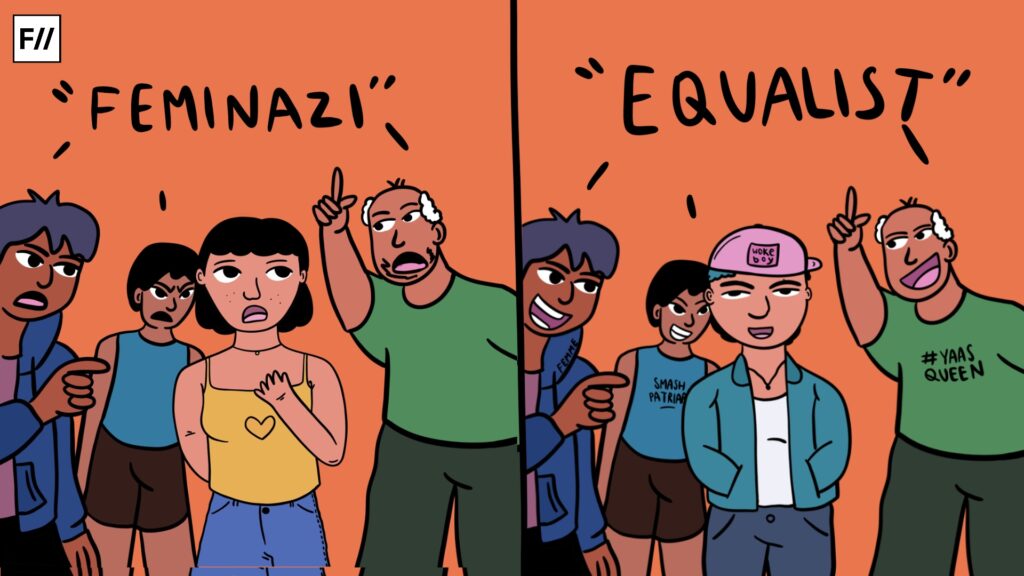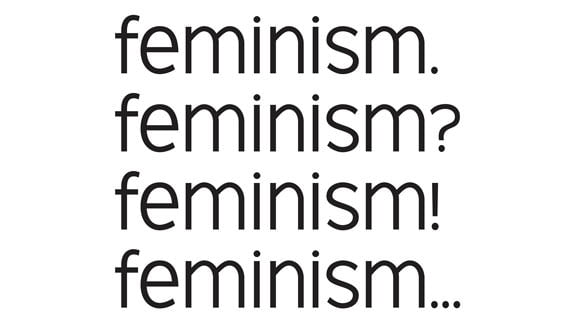Posted by De.B. Dubois
Has anyone gone through The Concise Oxford Thesaurus? Not as reading material, but just for fun – picking up words and checking their synonyms? If not, here’s what the thesaurus says:
- female (noun) 1. two males and female woman, lady, girl, lass: inf. Bird, chick, dame. 2. animals which are female. cow, duck, bitch, ewe, mare, sow, nanny goat, hen, doe, vixen.
- female (adjective) 1. a very feminine young woman. soft, delicate, gentle, tender, graceful, womanly, ladylike, girlish, refined, modest. 2. a feminine man. effeminate, womanish, effete, unmanly, unmasculine, weak; inf. Sissy, sissyish, limp-wristed.
- Opposites MASCULINE; MANNISH; MANLY.
Did you notice a pattern? In our daily use of words and connotations, we have picked up designated words for “female” as noun and adjective to describe both men and women. Most often in a derogatory way for a man, when he is termed a “girl”, “bitch”, “vixen”, “sissy”, “effeminate”, and “womanish”.
Somehow, male-dominated language and society have found a way to make the word “woman” or being “feminine” into a derogatory adjective for men. That being masculine, mannish and manly – even if it is thrown at a woman – is less of an abuse and more of an admiration.
Egalitarianism is a concept to be enjoyed by men – and men alone.
So when I am told/asked: “I don’t get it, if feminism is being equal, if it is meant to benefit everyone, why is it called feminism? Shouldn’t it be called egalitarianism or humanism?” Time and time again, as a feminist, I have been asked why feminism is called feminism?
Mostly, it is men who engage in this curiosity – and feminists who either get angry or explain calmly – either case, to no success! For their mind is already made-up. To mock female existence and their fight towards bringing women up to an equal status in a male-dominated society.
Why not Egalitarianism?
Egalitarianism was first visible on a vast scale when “Liberté, égalité, fraternité” or “Liberty, equality, brotherhood” became an official slogan of the French government. In August 1789, with the Déclaration des droits de l’homme et du citoyen (Declaration of the Rights of Man and of the Citizen), the French Constitution got framed around the basis in equal rights of men, but not of women. Even today, after almost 230 years, the French constitutional provisions of ‘rights of man’ are still given higher value in French constitutional court interpretations granting certain rights to men and not to women.
The same can be seen in the United States Declaration of Independence – July 1776, where an assertion of equality for men, but not of women, under Natural Rights – contingent upon the laws, customs, or beliefs of any particular culture or government, and therefore universal and inalienable (cannot be abandoned, restrained nor repealed by human laws). Making Egalitarianism a concept to be enjoyed by men – and men alone.
With various constitutions all over the world, having an interpretation of equality based mostly on Natural Laws – thus strengthening “masculinity” and “brotherhood” – women were treated less than human. Feminism is asking for a balance in these scales of corrupted “equality”, so to use ‘fem’ in the ‘ism’, is to give females the boost that they have been lacking for centuries throughout innumerable cultures.
Also Read: Hey, Feminazi! On Deconstructing The Ignorance Behind The Term
It is to boost ‘equality’ towards women, which has been consistently refused. Feminism doesn’t simply seek equality between all genders, it primarily seeks to give back women everything they were denied; this is why it’s called Feminism and not Egalitarianism.
Why not Humanism?
Humanism is a perspective that affirms some notion of human freedom and progress. It can be seen as benevolence toward one’s fellow humans and/or the values passed on by humane learning. It also focuses on human attribution towards non-theism and achievements of human agency, rather than a supernatural entity. Thus, looking to science instead of religious dogma in order to understand the world.
Humanism essentially focuses on how wonderful the human mind can be and how humans need not rely on religion, supernatural beliefs or an invisible entity to conduct their lives. This thought essentially came into view during the French Revolution and later on in Germany (by Young Hegelians/Left Hegelians – a group of intellectuals who wrote and reacted to keep up Georg W.F. Hegel’s legacy after his death in 1831) as a reference to an ethical philosophy centred on and around humankind, devoid of religion.
Humanism has nothing to do with fighting for equal rights for women. Unless men wish to indicate “benevolence toward one’s fellow humans” by pitifully acknowledging the woman her rightful place as another “fellow human”!
Thus, Humanism celebrates the innovative and progressive ideals as an ideology that marries reason, ethics, and socio-economical justice – calling upon science, to replace dogma, religious bigotry and supernatural, for decision-making. Therefore, Humanism is something entirely different than standing up for all human equality and rights – especially rights for female equality. This is why it’s called Feminism and not Humanism.
Humanism has nothing to do with fighting for equal rights for women.
Why is it called Feminism?
Can you actually, without any guilt, ignore the existing gender disparities throughout centuries across the entire world – unreasonably and significantly directed towards women? It is important to live in an equal society, but in that equal society – anonymous and non-existent will be the woman – if she doesn’t speak up. Without a movement that solely concentrates on bringing up the status of women on the same platform as that of the man, there will never be any equality for her.

Feminism is not just seeking equality between all genders, it seeks to give back women everything they have been denied. Feminism originally was focused on advancing the status of women in society, giving it its name to centre in on female issues. Thus, after various accumulative events, the term “Feminism” was derived from the suffrage movement of the early 1900’s, when historically women (all around the world, including British India) were campaigning for their right to vote.
Hence, the movement was almost only focused on women, because let’s face it, why would men fight for a right they already have? These are perhaps simple instances for the already empowered man – who does not need further empowerment.
Feminists don’t want you to forget that. Feminism wants you to see our struggle, not to be thinned by mixing it in with Egalitarianism or Humanism. In a way, feminism and the word “Feminist” commemorate centuries of struggles of women to simply have the right to voice themselves without being hushed or nullified as inferior to male thinking/logic.
Yes, today we recognise that one-size-does-not-fit-all in terms of oppression and ideals, and that there are people who suffer from various degrees of oppression ranging from racial issues, caste, sexual orientation, discrimination, disabilities, among other things. People, who demand to be called egalitarians, humanists and other terms rather than feminists, are overlooking the reality – we, the women, aren’t actually equal.
However, by wanting to change the term “feminism” mainly because you are afraid to identify under a movement led mainly by women for the rights of women, essentially says: a) You have no idea about feminism, b) You care more about the semantics than the history of discrimination, oppression, dejection of females all around the world that led to this movement, and c) You do not hesitate to humiliate the actions of countless females who fought and are still fighting for the rights of women.
Also Read: Gal Gadot, Ivanka Trump And The Mainstreaming Of Feminism
Debolina is an Indian-born-Swiss visual artist and feminist writer. Currently titled with a Master of Arts FHNW in Design from Hochschule für Gestaltung und Kunst, Basel. She enjoys extensive reading and research-oriented argumentations. She also enjoys long walks through nature trails, a good glass of absinthe from Val-de-Travers, and creating visual art. Her latest book can be found here and here. She can be followed on Facebook and Twitter.
Featured Image Credit: Otis College of Art and Design
About the author(s)
Guest Writers are writers who occasionally write on FII.





the definitions are wrong here are the actual definitions: https://en.oxforddictionaries.com/definition/female
Definition of female in English:
female
ADJECTIVE
1Of or denoting the sex that can bear offspring or produce eggs, distinguished biologically by the production of gametes (ova) which can be fertilized by male gametes.
‘a herd of female deer’
More example sentences
1.1 Relating to or characteristic of women or female animals.
‘a female audience’
‘female names’
More example sentencesSynonyms
1.2 (of a plant or flower) having a pistil but no stamens.
Example sentences
1.3 (of parts of machinery, fittings, etc.) manufactured hollow so that a corresponding male part can be inserted.
Example sentences
Ever heard of a “thesaurus”? A thesaurus is not a dictionary. The sentence clearly states “here’s what the thesaurus says…”. So if your criticism is based on definition… the author is not using definition. She’s using synonyms.
“(…) here’s what the thesaurus says”, the author is going for synonyms not definitions.
Also, dictionary doesn’t give definitions, they give meaning. So “definitions are wrong here are the actual definitions: https://en.oxforddictionaries.com/definition/female Definition of female in English…” is quite a foolish thing to say just to find an excuse to prove the author wrong. So please check a thesaurus before mansplaining.
Until I read this article, I asked the same question. The author presents a point that is not only compelling but also satisfying. It mirrors the concept of black lives matter vs. all lives matter. The latter removes all contrasts that represent African American struggles through out history. Egalitarianism does the same thing to women.
However it does nothing for the problem that a lot of people including a lot of women have with feminism as a movement. It is not really about equality because deep down women know that equality is a double edge sword that will cut women very deeply. Women do not want the grant men child custody in divorce court, Women do not want to do dirty dangerous jobs that only men do such as coal mining logging or work in dangerous chemical plants, Women do not want to be conscripted into the military in large numbers during wartime And women even though they may not say this still want maintain (to a certain measure) enough of the patriarchy to give them the freedom to opt out of their newfound responsibilities of being breadwinner and provider in the household if they choose thus imprisoning men in the same archaic gender roles that women are trying to dismantle.
I recognize the struggles and unfairness that women have faced throughout history they do-changes were in order and today, Women enjoy great games most of which exist in higher education and career achievement but they claimed they still have a long way to go. Perhaps in some ways it’s true. The problem however is that feminists want it both ways.
I’m glad you could finally understand the reason it is called feminism.
To the latter part though, I wouldn’t fully agree with what you want to imply. True feminists won’t opt out of responsibilities that come with the equality they would get. The way we have raised our children in a society that still divides things into a “man’s job” and a “woman’s job” is what leads many women and girls not take up fields like mining or the chemical industry. Many women do actually want to join the frontline military, but there are certain restrictions. Slowly, things are changing, as we see more and more women taking up jobs that are stereotypically men’s jobs and there are women who actually are the breadwinners of their family. Its a time where first time in forever, we see the options open for men as well as women for all kinds of jobs, more than ever. As Uncle Ben said, “With great power, comes great responsibility”, women who are willing to stand equal to men must also be ready to take up the responsibility of it and thats what a true feminist would do. The ones being selectively feminists are one of those pseudo-feminists, ruining all the great work done by our historical heroes.